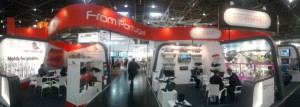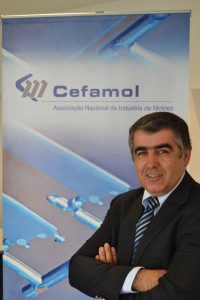In this interview with João Faustino, President of Cefamol (Associação Nacional da Indústria de Moldes – Portuguese Association for the Mould Industry) he talks to us about different topics tied up with the context where Portuguese moulds and dies sector and the Association live and work
Which is the present situation of mould and die sector in Portugal and which developments can be expected?
Over the years, Portugal has developed a consistent strategy to consolidate its presence in the international market. Exporting more than 90% of production, the Portuguese Moulds Industry has stood out from international competition due to the range of high added-value competitive solutions it offers. Based on this experience, investment in state-of-the-art technology and corporate cooperation, the Portuguese Moulds Industry has created and participated in partnerships and projects with clients, suppliers, universities and national and international knowledge centres. This has allowed the products and services of Portuguese companies to evolve in a qualitative manner, allowing them to find new and more competitive solutions for clients while achieving a position of reference at European level. In fact, 2013 was the best year ever for the Portuguese Mould Making Industry in terms of production and exports, a trend which is expected to continue in 2014 (editor’s note: at the time of the interview final data were not yet available). For 2015, we feel there is potential for the Portuguese industry to maintain this level of activity using installed capacity in terms of engineering, product design, prototyping, manufacture of accessories and control devices or the production of parts. Our industry is active and has always sought to overcome market adversity and face international competitors. We are optimistic and expecting new projects coming from our clients during the year and we believe this growth trend in European market will continue.
According to you, which is the proper way to deal with the current market and to overcome its challenges?
To deal with current market demands and challenges is not easy for SMEs. There is the need for a strategic alignment of the industry to cover new market requirements. From our point of view, companies need to emphasize the broadening of their value chain as well as to invest in the use of new technologies and in the development of partnerships with clients, suppliers and knowledge centres to be successful. We believe these factors will ensure position and recognition in international market and among leaders in tooling. In what concerns Portuguese industry, there is also a whole range of possible scenarios in economic, political and social terms where any international instability could affect us, as we are essentially an export driven industry. However, we recognize that our sector has always been highly dynamic and versatile and normally capable of adapting to different types of contingencies.
Which are the distinctive features of mould and die sector in Portugal?
Critical factors for competitiveness depend from customer to customer, but in general, more and more, clients are looking for cost reduction and production strategies to reduce the time to market in the development of new products. Under these topics, Portuguese toolmakers are facing challenges finding faster and more efficient solutions for production, involving new technologies and equipments that require an extensive know-how, but also experienced and qualified people. Also an emphasis on innovation, R&D and recognition of the industry’s international image has brought new opportunities for Portuguese companies, more specifically in the development of new products, in the use of new materials and technologies which allow faster and more efficient solutions, in the broadening of the industry’s chain of value which brings new areas of business both up and downstream mould production. This has also allowed us to enter into new markets, from both a geographical and a sectorial perspective, as is the case of medical devices, aerospace industry, energy and environmental products, as well as new areas of more traditional sectors, such as automotive or packaging. This is not an easy task for SMEs that, in average, have between 20 to 30 workers. Cooperation and collaboration are the key words for success.
Which are the needs and the main problems that Portuguese mould and die makers and your members highlight today?
Given the long production cycles that characterize the manufacture of moulds and the long payment terms from clients, companies are obliged to develop real financial engineering in order to remain active in the market and with up-to-date technology to deal with market requirements. Combining this with low prices for moulds you will find the main difficulties that the Portuguese Moulds Industry faces today. On the other hand, we are facing some difficulties to attract young an qualified people to the Industry. We know this is a problem to all the European countries and there is the need to find solutions to overcome this situation.
Energy saving/efficiency and environmental sustainability: which is the stance of your Country and of your members about these subjects?
Concerning energy saving and efficiency, our sector is aligned with other industries in Portugal. In fact, companies try to be more efficient in their production processes, using low emission equipments and materials. Energy saving is clearly a priority for the next years. Concerning environmental sustainability, we believe that mould making should be considered as a clean industry. Anyway, more and more, companies are looking to these subjects in a different manner respect to the past. Environmental sustainability and the use of clean energies are becoming trends on our industry. It’s also becoming a request from several international clients having suppliers respecting their policies.
 Which is the attitude of your members and of Portuguese mould and die makers about new processing technologies? Are they considered as a challenge, a limit or an opportunity?
Which is the attitude of your members and of Portuguese mould and die makers about new processing technologies? Are they considered as a challenge, a limit or an opportunity?
In what concerns Portuguese mould makers innovation is a must and it’s our DNA. During past years we have invested heavily in new technologies to guarantee performance, time to market and flexible solutions required by our clients. We have seen a major focus on machining technologies (high-speed and 5 axes machining), robotics and automation of processes (palletization, feed robots, etc.), laser technologies or technologies for rapid prototyping and rapid tooling. Anyway, technology is not enough. You have to combine it with production processes, with organizational and management systems, with cost control and qualified human resources. Only this combination can bring us added value and competitive solutions for the international market. We believe these challenges are an opportunity for development and differentiation in the World market.
How do your members partake in Association life? Which are the surplus values that they can acquire from their participation?
Our members regularly partake in Association life, attending seminars and workshops, participating in reunions to discuss the organization of promotional activities, sharing ideas about challenges and opportunities for the industry, discussing strategies for its development and what Association activities should be to support their individual efforts. Among others, this regular participation allows members to share ideas and experiences, reinforce their networking, personal and business relationships, gather market and technological information and build up common initiatives or solutions to overcome general constraints to the industry.
Which is the situation regarding the current need of increasingly trained workers? Does Cefamol organize training classes?
As in any other European country, our sector needs young and qualified people. Widening their value chain, companies need to enlarge their competences and know-how on different areas. Under this subject, Cefamol works with other institutions in Portugal, such as training centres dedicated to the Industry, our technological centre, local schools and universities, trying to develop common solutions to overcome these constraints. Our Association regularly promotes training activities for its members, but also for non-members, inside and outside the companies.
Do Portuguese mould and die makers unite in network model of organization to make use of fundings? Which is the role of Associations in this context?
Cefamol supports its members’ efforts to define strategies and initiatives that may help companies to achieve and develop common activities to overcome industry constraints, but also to follow business and growth opportunities. The Association coordinates the global strategy for the international promotion of the sector, expanding its knowledge and visibility in new markets. Also at technological level, Cefamol coordinates its activities with the sector Technological Center (Centimfe) to bring companies to training, innovation or R&D projects at both national and international level. The Association also tries to get fundings from sponsors or national/international programs that may help to put these activities into action. Anyway, participating companies are always supporting the major part of any investment.
Clear international orientation
Internationalization is a crucial topic today: which is the stance of Portuguese mould and die makers and of Cefamol members about that? The reply is easy, as the answer of João Faustino, President of Cefamol, shows: «Our industry was born in the international market and always develops its competences with an international focus. For many years the internal market needs were very low when compared with our production capacity. According to that, companies were emerging with an international orientation». In the last decades over 90% of total production was exported and the expectations are to continue like that in the near future. «In our days our main market is Europe but we are always trying to increase our relationship with North American or Latin American markets, where we have long experience, tradition, recognition and know-how».
As the President of Cefamol explains, Portuguese mould makers are more and more involved with universities, research and knowledge centres in developing common projects or activities that could lead companies to new achievements or new solutions they can use with their clients. «That’s a clear trend in our sector – João Faustino continues -. Widening their value chain on product development and engineering areas, Portuguese mould makers will certainly increase their research in these areas and add it on their integrated solutions». Based on clients requirements, companies are studying new materials, small series productions and additive manufacturing as key enabling technologies to provide added value solutions. Robotics and automation are also a clear trend in Portuguese Mould Making Industry. «Our member companies are increasingly investing in these areas to accelerate and optimize production processes». The creation of automatic production cells with feed robots and integration of different activities, such as machining, finishing or measuring, are already factual and widespread in Portugal at this moment.




